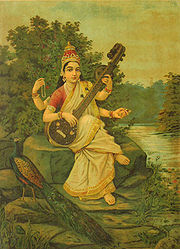
Vidya
Encyclopedia

Sanskrit
Sanskrit , is a historical Indo-Aryan language and the primary liturgical language of Hinduism, Jainism and Buddhism.Buddhism: besides Pali, see Buddhist Hybrid Sanskrit Today, it is listed as one of the 22 scheduled languages of India and is an official language of the state of Uttarakhand...
name for knowledge
Knowledge
Knowledge is a familiarity with someone or something unknown, which can include information, facts, descriptions, or skills acquired through experience or education. It can refer to the theoretical or practical understanding of a subject...
. It is frequently used in Hinduism
Hinduism
Hinduism is the predominant and indigenous religious tradition of the Indian Subcontinent. Hinduism is known to its followers as , amongst many other expressions...
as honorific
Honorific
An honorific is a word or expression with connotations conveying esteem or respect when used in addressing or referring to a person. Sometimes, the term is used not quite correctly to refer to an honorary title...
stemming from the Puranic conception of knowledge and learning. Vidya is an epithet
Epithet
An epithet or byname is a descriptive term accompanying or occurring in place of a name and having entered common usage. It has various shades of meaning when applied to seemingly real or fictitious people, divinities, objects, and binomial nomenclature. It is also a descriptive title...
of the Hindu goddess
Goddess
A goddess is a female deity. In some cultures goddesses are associated with Earth, motherhood, love, and the household. In other cultures, goddesses also rule over war, death, and destruction as well as healing....
Sarasvati, consort of Brahma
Brahma
Brahma is the Hindu god of creation and one of the Trimurti, the others being Vishnu and Shiva. According to the Brahma Purana, he is the father of Mānu, and from Mānu all human beings are descended. In the Ramayana and the...
according to Hindu
Hindu
Hindu refers to an identity associated with the philosophical, religious and cultural systems that are indigenous to the Indian subcontinent. As used in the Constitution of India, the word "Hindu" is also attributed to all persons professing any Indian religion...
beliefs. She has superior spiritual feminine energy or the Param Prakriti, which purifies, empowers and uplifts the individual. Hence, She is called the Goddess of Learning.
Festivals
During Navaratri, on the 9th day, every house ceremoniously keeps books and all musical instruments near the puja place early at dawn and worship her with special prayers. On this day no studies or any performance of arts is carried out, as it is considered that the Goddess herself is blessing the books and the instruments. When the festival concludes on the tenth day of Navaratri or Vijaya Dashami as its popularly known, the goddess is worshipped before the books and the musical instruments are removed.Small children of 2-3 years start studying on this day which is called Vidyarambham (Commencement of Knowledge). Each person will wear new clothes and traditional attire and start learning something new on this day. Guru
Guru
A guru is one who is regarded as having great knowledge, wisdom, and authority in a certain area, and who uses it to guide others . Other forms of manifestation of this principle can include parents, school teachers, non-human objects and even one's own intellectual discipline, if the...
s (teachers) are worshipped on this day as the embodiments of Goddess Sarasvati.

